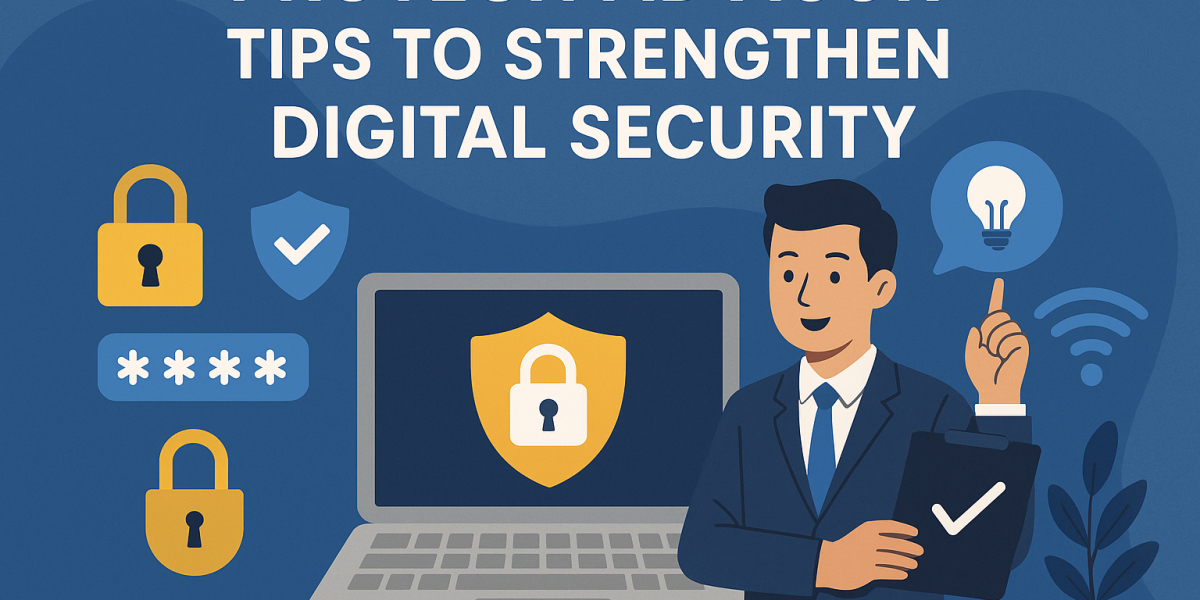In today’s interconnected world, digital security is no longer a luxury—it is a necessity. With the rise of cyber threats, data breaches, and phishing scams, businesses and individuals are under constant risk of losing sensitive information. A single security lapse can result in financial loss, identity theft, or damage to a company’s reputation. This is where Protech Advisor plays a crucial role by offering expert strategies to safeguard digital assets.
In this blog, we’ll explore Protech Advisor tips to strengthen digital security, covering essential practices that every organization and individual should adopt to stay safe online.
1. Regularly Update Software and Systems
One of the simplest yet most effective security measures is keeping software, applications, and operating systems updated. Cybercriminals often exploit outdated software vulnerabilities to gain unauthorized access.
Protech Advisor recommends:
Enable automatic updates for operating systems and antivirus tools.
Regularly patch business software like CRM, ERP, or accounting systems.
Remove unused or outdated applications that may create loopholes.
Timely updates ensure your devices and networks remain protected against the latest threats.
2. Use Strong and Unique Passwords
Weak or repeated passwords remain a leading cause of data breaches. Many users still rely on predictable combinations like “123456” or “password,” which hackers can easily crack.
Protech Advisor suggests:
Use at least 12 characters combining uppercase, lowercase, numbers, and symbols.
Avoid using the same password for multiple accounts.
Consider using a trusted password manager for storing and generating secure credentials.
By strengthening password habits, both individuals and businesses can significantly reduce the risk of unauthorized access.
3. Enable Multi-Factor Authentication (MFA)
Passwords alone are not enough in today’s cyber landscape. Multi-factor authentication adds an extra layer of security by requiring users to verify their identity through a secondary method such as SMS codes, email verification, or biometric scans.
Protech Advisor emphasizes:
Always activate MFA for email accounts, financial platforms, and cloud storage.
Use authenticator apps instead of SMS whenever possible for better protection.
Apply MFA policies across your organization to secure employee accounts.
This simple practice ensures that even if passwords are stolen, attackers cannot easily break in.
4. Educate Employees and Teams on Cybersecurity
Human error remains one of the biggest cybersecurity risks. Employees might click on phishing emails, download malicious attachments, or fall for social engineering scams.
Protech Advisor’s training tips include:
Conduct regular cybersecurity workshops.
Teach staff how to identify phishing attempts and fake websites.
Encourage reporting of suspicious activities without fear of penalty.
Building a security-aware culture ensures that everyone becomes the first line of defense against cyber threats.
5. Secure Your Wi-Fi and Networks
Unsecured networks are easy targets for hackers. Whether at home or in the office, ensuring your Wi-Fi is protected is critical.
Protech Advisor’s recommendations:
Always change default router passwords.
Use WPA3 encryption for maximum security.
Create a separate guest network to protect sensitive company data.
Disable remote management features when not required.
A secure network setup greatly reduces the risk of unauthorized access and data theft.
6. Backup Data Regularly
Data loss can occur not just from cyberattacks but also from hardware failures, natural disasters, or human mistakes. Having a reliable backup system ensures that critical files can be restored quickly.
Protech Advisor suggests:
Implement automated daily backups for business-critical files.
Use both cloud storage and external drives for redundancy.
Test your recovery process to ensure data can be retrieved efficiently.
Regular backups act as a safety net, allowing businesses to recover smoothly after a cyber incident.
7. Monitor for Suspicious Activities
Cybercriminals often leave traces before a major attack. Proactive monitoring can help detect unusual behavior and stop breaches early.
Protech Advisor’s security measures include:
Deploy intrusion detection systems (IDS) and firewalls.
Set up alerts for suspicious login attempts or file changes.
Regularly review logs to identify anomalies.
By monitoring systems continuously, organizations can minimize the impact of potential attacks.
8. Protect Against Phishing Attacks
Phishing remains the most common method hackers use to steal data. Cybercriminals trick users into clicking malicious links or entering credentials on fake websites.
Protech Advisor’s anti-phishing tips:
Verify email addresses before clicking on links.
Hover over links to check their real destination.
Avoid downloading attachments from unknown sources.
Use advanced spam filters to block suspicious emails.
Vigilance and awareness are the strongest weapons against phishing attempts.
9. Secure Mobile Devices
With remote work and digital mobility, smartphones and tablets often contain sensitive data. Unfortunately, many users overlook mobile security.
Protech Advisor advises:
Enable device encryption and screen locks.
Install security updates promptly.
Use mobile security apps to detect malware.
Avoid connecting to unsecured public Wi-Fi without a VPN.
Protecting mobile devices ensures business continuity and keeps personal data safe.
10. Implement Role-Based Access Controls
Not every employee needs access to all company data. Unrestricted permissions increase the chances of misuse or accidental leaks.
Protech Advisor recommends:
Assign access levels based on job roles.
Regularly review and update user permissions.
Immediately revoke access when an employee leaves the organization.
Restricting access ensures sensitive information remains only in trusted hands.
11. Use Encryption for Sensitive Data
Encryption converts data into unreadable code that can only be deciphered with a security key. It is essential for protecting confidential information both in transit and at rest.
Protech Advisor suggests:
Encrypt financial records, customer data, and confidential files.
Use HTTPS protocols for websites to secure communications.
Apply end-to-end encryption for messaging platforms.
Even if attackers intercept encrypted data, it remains useless without the decryption key.
12. Regular Security Audits and Penetration Testing
No system is completely foolproof. Regular audits and penetration testing help identify vulnerabilities before hackers exploit them.
Protech Advisor strategies include:
Hire ethical hackers to simulate real-world attacks.
Conduct quarterly security assessments.
Fix discovered weaknesses immediately.
This proactive approach keeps security systems strong and resilient.
Conclusion
Cybersecurity is not a one-time effort but an ongoing process that demands vigilance, awareness, and the right tools. From updating software and strengthening passwords to employee training and encryption, every measure plays a role in safeguarding sensitive information.
Protech Advisor’s tips to strengthen digital security empower businesses and individuals to stay a step ahead of cybercriminals. By adopting these practices, you can build a secure digital environment where your data and operations remain protected.
Remember, digital security is not just about technology—it’s about creating a culture of safety, awareness, and responsibility in the online world.

















